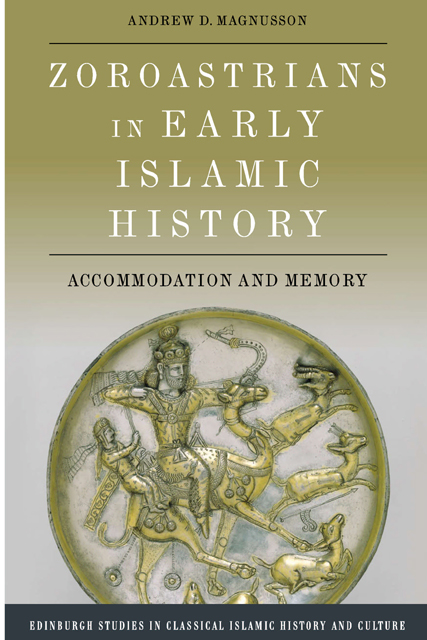Book contents
- Frontmatter
- Contents
- Acknowledgements
- A Note on Transliteration and Abbreviation
- Dedication
- Introduction: Zoroastrianism, Islam and Accommodation
- 1 Myth and Countermyth in Zoroastrian Historiography
- 2 Umar’s Dilemma: The Taxation of People Without a Book
- 3 Marriage, Meat and the Limits of Accommodation
- 4 Salman’s Charter as a Site of Memory
- 5 Fire Temple Desecration and Triumphal Tales of Violence
- 6 Rhetorical Zoroastrians in Early Islamic Discourse
- Conclusion: An Ambivalent Accommodation
- Appendix A Translation of an Iranian Recension of Salman’s Charter
- Appendix B Translation of an Indian Recension of Salman’s Charter
- Bibliography
- Index
1 - Myth and Countermyth in Zoroastrian Historiography
Published online by Cambridge University Press: 25 April 2023
- Frontmatter
- Contents
- Acknowledgements
- A Note on Transliteration and Abbreviation
- Dedication
- Introduction: Zoroastrianism, Islam and Accommodation
- 1 Myth and Countermyth in Zoroastrian Historiography
- 2 Umar’s Dilemma: The Taxation of People Without a Book
- 3 Marriage, Meat and the Limits of Accommodation
- 4 Salman’s Charter as a Site of Memory
- 5 Fire Temple Desecration and Triumphal Tales of Violence
- 6 Rhetorical Zoroastrians in Early Islamic Discourse
- Conclusion: An Ambivalent Accommodation
- Appendix A Translation of an Iranian Recension of Salman’s Charter
- Appendix B Translation of an Indian Recension of Salman’s Charter
- Bibliography
- Index
Summary
Scholars who write about interreligious encounters in the pre-modern Middle East are sometimes tempted to compose apologetic accounts of pluralistic harmony or polemical narratives of cross-confessional strife. The interpretive pendulum easily swings between myth and countermyth as Mark Cohen has documented with regard to Jewish historiography. For example, historian Salo Baron used the disparaging term ‘lachrymose’ in 1928 to describe a school of interpretation that viewed the experience of medieval European Jews through a veil of tears. Proponents of this dismal perspective described Jewish history as if it lurched from crisis to crisis. The lachrymose narrative was based in part on eschatological beliefs about the coming of the Messiah and Jewish redemption. Its counterpart was the Jerusalem school of historiography, which David Nirenberg describes as ‘a post-Holocaust, secularised version’ of the lachrymose school. Though its messianism was more muted, the Jerusalem school shared with the lachrymose school a teleological view of history, in which each pogrom foreshadowed greater persecutions to come. Both schools painted a fairly bleak picture of Jewish–Christian relations in medieval Europe. According to Cohen, they developed in response to the nineteenth-century myth of a Jewish Golden Age in Islamicate Spain. That rosy narrative, which contrasted so sharply with the anti-Semitism of Christendom in the Middle Ages, was intended to prod modern Europeans to achieve the promise of liberalism by extending political and social equality to Jewish citizens.
Similar tendencies toward mythmaking exist in the study of Zoroastrian history. The period from the Islamic conquest of Persia to the end of the so-called Iranian intermezzo – that is, from the seventh to the eleventh centuries – was supposedly an unmitigated disaster for adherents of the Good Religion. According to Zoroastrian tradition, Muslims forced them to convert to Islam by the sword. Zoroastrians who continued to practice their religion struggled under the weight of the jizya, or capitation tax, a form of economic jihad. Most of the Avesta was lost or shamelessly burned by Muslims. Parsis fled to India to escape the contemptuous and intolerable treatment of the Umayyads. Abbasid caliphs inaugurated a general persecution of Zoroastrians, who lost their protected status in Islamic law. By the ninth century, ‘the Zoroastrian population was left with the options of apostasy, migration, martyrdom or marginalisation’. Such ideas encourage a grim conception of Muslim–Zoroastrian relations in Late Antiquity.
- Type
- Chapter
- Information
- Zoroastrians in Early Islamic HistoryAccommodation and Memory, pp. 19 - 32Publisher: Edinburgh University PressPrint publication year: 2022



